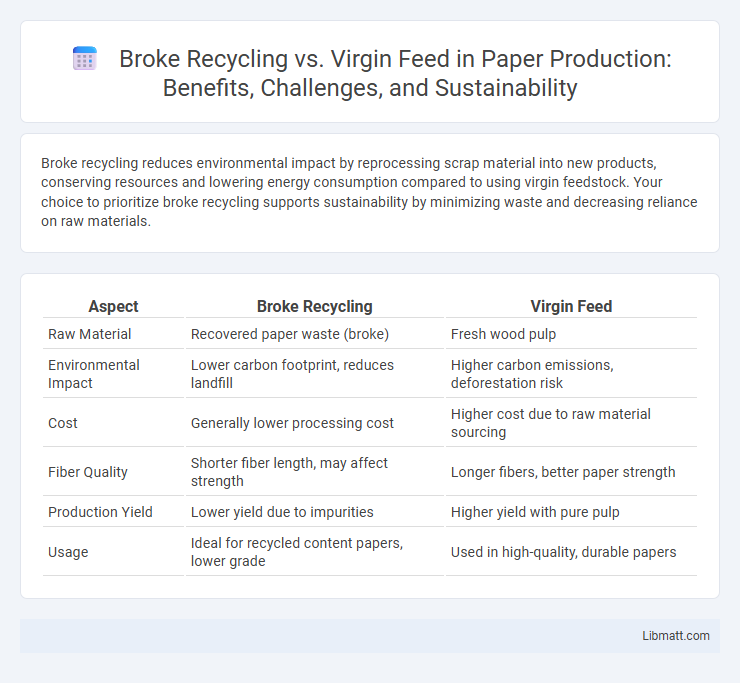Broke recycling reduces environmental impact by reprocessing scrap material into new products, conserving resources and lowering energy consumption compared to using virgin feedstock. Your choice to prioritize broke recycling supports sustainability by minimizing waste and decreasing reliance on raw materials.
Table of Comparison
| Aspect | Broke Recycling | Virgin Feed |
|---|---|---|
| Raw Material | Recovered paper waste (broke) | Fresh wood pulp |
| Environmental Impact | Lower carbon footprint, reduces landfill | Higher carbon emissions, deforestation risk |
| Cost | Generally lower processing cost | Higher cost due to raw material sourcing |
| Fiber Quality | Shorter fiber length, may affect strength | Longer fibers, better paper strength |
| Production Yield | Lower yield due to impurities | Higher yield with pure pulp |
| Usage | Ideal for recycled content papers, lower grade | Used in high-quality, durable papers |
Introduction to Broke Recycling and Virgin Feed
Broke recycling involves reprocessing scrap materials, such as paper or plastics, to create new products, significantly reducing waste and conserving natural resources. Virgin feed refers to raw, unprocessed materials extracted directly from natural sources, offering consistent quality but with higher environmental impact due to resource extraction. Choosing broke recycling over virgin feed supports sustainability by minimizing energy consumption and lowering carbon emissions in manufacturing.
Definitions: What is Broke Recycling?
Broke recycling refers to the process of reclaiming scrap paper or production waste, known as broke, and reprocessing it to create new paper products. This method significantly reduces the demand for virgin feedstock, which is raw material sourced directly from trees or fiber crops. Understanding broke recycling helps optimize your paper production by minimizing environmental impact and lowering material costs.
Understanding Virgin Feed in Manufacturing
Virgin feed refers to raw, unprocessed materials sourced directly from nature or newly produced synthetics, ensuring consistent quality and purity in manufacturing processes. Unlike broke recycling, which repurposes leftover scrap and may introduce variability, virgin feed provides manufacturers with reliable and uncontaminated inputs essential for high-performance products. Understanding the importance of virgin feed can help you balance cost efficiency and product integrity in your production line.
Environmental Impact: Broke Recycling vs Virgin Feed
Broke recycling significantly reduces environmental impact by lowering energy consumption and greenhouse gas emissions compared to virgin feed production, which involves extensive resource extraction and processing. Recycling broke minimizes landfill waste and water usage, contributing to a circular economy and conserving natural resources. Studies show that recycled fibers can decrease carbon footprint by up to 40% versus virgin fiber production, highlighting its role in sustainable manufacturing.
Cost Comparison: Economic Benefits and Drawbacks
Broke recycling significantly reduces material costs compared to virgin feed by utilizing scrap materials, which lowers production expenses and minimizes waste disposal fees. However, initial investments in specialized recycling equipment and potential quality inconsistencies may increase operational costs. Your business can benefit economically by balancing these factors to optimize cost savings and maintain product quality.
Quality and Performance Differences
Broke recycling offers a more sustainable alternative to virgin feed but often presents challenges in maintaining consistent quality and performance due to contamination risks and material degradation. Virgin feed typically ensures higher purity and uniform chemical properties, resulting in superior mechanical strength, color clarity, and processability for demanding applications. Advances in sorting and cleaning technologies are narrowing the performance gap, yet virgin feed remains preferred for high-specification products requiring stringent quality standards.
Energy Consumption in Broke vs Virgin Processes
Energy consumption in broke recycling processes is significantly lower compared to virgin feed production, often reducing energy use by 30-50%. Recycling broke requires less heat and fewer raw material extractions, which translates directly to decreased fossil fuel reliance and carbon emissions. This energy efficiency makes broke recycling a crucial strategy for sustainable manufacturing and resource conservation.
Influence on Supply Chain Sustainability
Broke recycling significantly enhances supply chain sustainability by reducing raw material consumption and lowering greenhouse gas emissions compared to virgin feed production. Utilizing recycled materials minimizes waste and energy usage, promoting circular economy principles in manufacturing processes. Your supply chain gains resilience and environmental credibility by integrating broke recycling, aligning operations with global sustainability goals.
Industry Trends: Adoption and Innovations
Broke recycling is rapidly gaining traction in the packaging and paper industries due to its sustainability benefits and cost-effectiveness compared to virgin feedstock. Advances in sorting technologies and chemical recycling processes have improved the quality and efficiency of broke incorporation, reducing reliance on virgin materials. Industry leaders are investing in circular economy models, which prioritize broke recycling innovations to meet stringent environmental regulations and consumer demand for eco-friendly products.
Future Prospects: Towards a Circular Economy
Broke recycling significantly reduces waste and conserves resources compared to virgin feed, positioning it as a cornerstone for the circular economy. Advances in material recovery and processing technologies enhance the quality and economic viability of recycled inputs, driving industries towards sustainable production cycles. Your investment in broke recycling fosters a future with minimized environmental impact and optimized resource efficiency.
Broke recycling vs virgin feed Infographic

 libmatt.com
libmatt.com